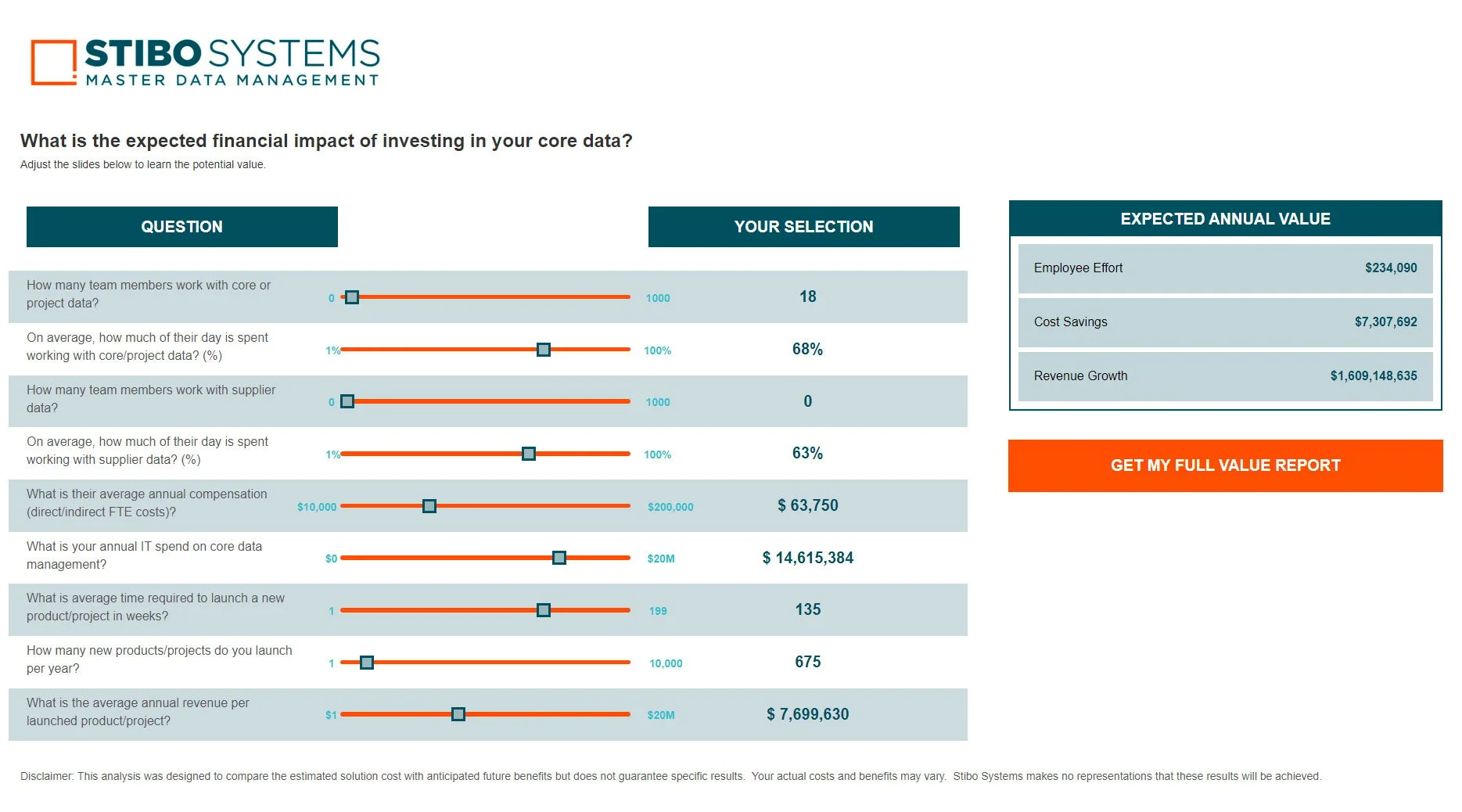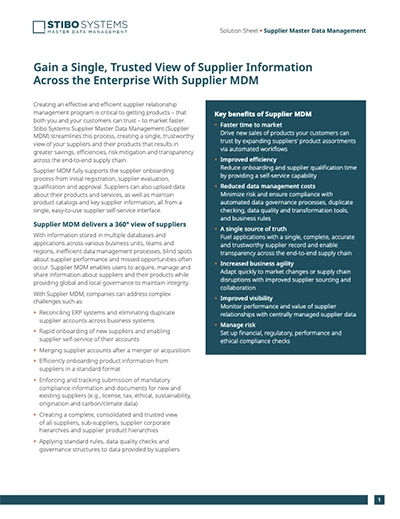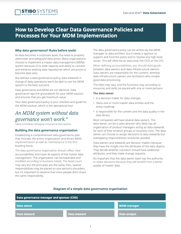In today's globalized economy, supplier management is a critical function for businesses of all sizes. Efficiently managing suppliers can lead to improved supplier performance, better supply chain visibility, reduced costs and increased profitability. However, manual supplier management processes can be time-consuming and error-prone, leading to missed opportunities and increased risk. This is where supplier management solutions come into play. These solutions leverage technology to automate and streamline supplier management processes, providing businesses with real-time insights into supplier performance, compliance and risk.
In this blog post, we will explore the benefits of supplier management solutions, key features to look for when choosing a solution and best practices for implementing and optimizing these solutions. Whether you are a small business or a multinational corporation, a supplier management solution can help you improve your supplier relationships, optimize your supply chain and achieve better business outcomes.

What is a supplier management solution?
A supplier management solution is a software platform or system that enables businesses to manage their relationships with suppliers and vendors. The goal of a supplier management solution is to streamline the procurement process and optimize the supply chain, resulting in better vendor selection, improved contract negotiation, reduced risk and increased efficiency.
A supplier management solution typically includes features such as:
-
Supplier onboarding: The process of adding new suppliers to the system and collecting relevant information such as contact details, certifications and compliance documentation.
-
Supplier performance tracking: The ability to monitor supplier performance metrics such as delivery time, quality and cost, and to generate reports to identify areas for improvement.
-
Contract management: The ability to manage contract terms and conditions such as pricing, delivery timelines and payment terms and to track key dates and milestones.
-
Risk management: The ability to assess supplier risk and to monitor for potential issues such as supplier bankruptcy, quality problems or supply chain disruptions.
-
Communication and collaboration: The ability to communicate with suppliers and to collaborate on projects and initiatives such as joint product development or supplier-led innovation.
-
Analytics and reporting: The ability to generate reports and insights on supplier performance, contract compliance and other key metrics to inform decision-making and identify opportunities for improvement.
Overall, a supplier management solution can help businesses to better manage their supplier relationships, reduce risk and improve efficiency and effectiveness in their procurement and supply chain operations.
What are the benefits of a supplier management solution?
There are several benefits of a supplier management solution for businesses, including:
-
Improved supplier selection: A supplier management solution allows businesses to collect and analyze data on potential suppliers such as pricing, quality and delivery capabilities to make more informed decisions about which suppliers to work with.
-
Increased efficiency: A supplier management solution streamlines the procurement process, allowing businesses to onboard suppliers more quickly, negotiate contracts more effectively and manage relationships more efficiently.
-
Enhanced collaboration: A supplier management solution facilitates communication and collaboration between businesses and suppliers, allowing for joint product development, innovation and problem-solving.
-
Better risk management: A supplier management solution enables businesses to monitor supplier performance and identify potential risks such as supply chain disruptions, quality problems or compliance issues in order to take proactive measures to mitigate those risks.
-
Cost savings: A supplier management solution can help businesses to identify cost-saving opportunities such as consolidating suppliers, negotiating better pricing or optimizing inventory levels.
-
Improved compliance: A supplier management solution can help businesses to ensure that their suppliers are meeting regulatory and compliance requirements such as environmental or labor standards.
Overall, a supplier management solution can help businesses to improve their supply chain operations, reduce risk, increase efficiency and ultimately drive better business outcomes.
What are the challenges of implementing a supplier management solution?
Implementing a supplier management solution can bring many benefits to a business, but it can also present some challenges. Here are some of the common challenges businesses may face when implementing a supplier management solution:
-
Data quality and integration: One of the biggest challenges with implementing a supplier management solution is ensuring that the data collected from suppliers is accurate, complete and integrated with other systems in the business. This requires establishing clear data governance policies and processes as well as ensuring that the supplier management solution integrates with other systems, such as Enterprise Resource Planning (ERP) or Customer Relationship Management (CRM) systems.
-
Adoption and change management: Implementing a new system can be disruptive to the organization, especially if employees are resistant to change or are not fully trained on how to use the system. Ensuring adoption and effective change management is critical to realizing the full benefits of a supplier management solution.
-
Supplier onboarding and engagement: Collecting the necessary data from suppliers such as certifications, compliance documentation and performance metrics can be time-consuming and challenging. Additionally, engaging with suppliers and getting them to participate in the system can be difficult, especially if they are already working with other systems or processes.
-
System customization and maintenance: To get the most out of a supplier management solution, businesses often need to customize the system to meet their specific needs. This requires a high level of technical expertise and ongoing maintenance and support to ensure the system remains up-to-date and effective.
-
Cost: Implementing a supplier management solution can be expensive, especially for smaller businesses. The costs associated with the system such as licensing fees, customization and maintenance need to be carefully considered against the potential benefits of the system.
Overall, implementing a supplier management solution requires careful planning, investment and ongoing management to ensure that the system is effectively integrated with the business and delivering the expected benefits.
Solution Sheet
Gain a Single, Trusted View of Supplier Information
Across the Enterprise With Supplier Master Data Management
How to choose the right supplier management solution for your business needs
Choosing the right supplier management solution for your business can be a critical decision that can impact your supply chain operations and ultimately your bottom line. Here are some key factors to consider when selecting a supplier management solution:
1. Identify your business needs
Start by identifying the key challenges and pain points in your supply chain operations that you want the supplier management solution to address. This will help you to prioritize the features and functionalities you need in the system.
2. Evaluate features and functionalities
Look for a supplier management solution that has the features and functionalities that align with your business needs. Consider the following features: supplier onboarding, performance tracking, contract management, risk management, collaboration and reporting.
3. Check integration capabilities
Make sure the supplier management solution can integrate with other systems in your business, such as Enterprise Resource Planning (ERP) and Customer Relationship Management (CRM) systems. Integration is critical for ensuring data accuracy and reducing duplication of efforts.
4. Consider ease of use
Ensure that the supplier management solution is user-friendly and easy to use. This will help to ensure high adoption rates and minimize training costs.
5. Evaluate the vendor's reputation and experience
Do some research on the vendor and their experience with implementing supplier management solution. Check for reviews, references and case studies to see how the vendor has helped other businesses with similar needs.
6. Consider customization and scalability
Determine if the supplier management solution can be customized to meet your specific business needs and if it is scalable to support your future growth.
7. Evaluate the cost
Consider the total cost of ownership, including licensing fees, customization, maintenance and support. Determine if the benefits of the supplier management solution justify the cost.
By considering these factors, you can choose a supplier management solution that aligns with your business needs and helps you to achieve your supply chain goals.
Best practices for implementing a supplier management solution
Implementing a supplier management solution can bring many benefits to your business, but it requires careful planning and execution to ensure that the system is effectively integrated with your business processes and delivers the expected benefits.
Here are some best practices to consider when implementing a supplier management solution:
1. Define clear objectives
Clearly define the objectives and goals you want to achieve with the supplier management solution. Ensure that they align with your overall business strategy and that you communicate them effectively to all stakeholders.
2. Involve key stakeholders
Involve all key stakeholders, including procurement, finance, legal and IT teams in the implementation process. This will help to ensure that everyone understands the benefits of the system and is committed to making it work.
3. Establish a data governance framework
Establish clear data governance policies and processes to ensure that the data collected from suppliers is accurate, complete, and consistent. This includes establishing data quality standards, data entry processes and validation procedures.
4. Define supplier onboarding processes
Define clear processes for onboarding new suppliers, including data collection, compliance checks and performance tracking. This will help to ensure that all suppliers are fully integrated into the system and are meeting your business requirements.
5. Ensure effective change management
Implementing a supplier management solution can be disruptive to your business, so it is important to ensure effective change management. This includes communicating with all stakeholders, providing training and support and addressing any concerns or issues that arise during the implementation process.
6. Monitor and measure performance
Monitor and measure the performance of the supplier management solution against your defined objectives and goals. This includes tracking supplier performance, identifying areas for improvement and adjusting processes and procedures as needed.
7. Continuously improve
Continuously improve your supplier management solution and your supplier management processes to ensure that they remain effective and aligned with your business needs. This includes seeking feedback from stakeholders, keeping up-to-date with industry best practices and embracing new technologies and innovations.
By following these best practices, you can successfully implement a supplier management solution that helps you to optimize your supply chain operations, improve supplier relationships and achieve better business outcomes.
Executive Brief
How to Develop Clear Data Governance Policies and Processes
for Your Master Data Management Implementation
Supplier master data management as supplier management solution
Supplier master data management is an important aspect of supplier management and can be considered as a supplier management solution. It involves the management of all supplier data, including contact information, payment terms, compliance information and performance metrics, in a single, centralized repository.
Here are some benefits of supplier master data management:
-
Data accuracy and consistency: Supplier master data management ensures that all supplier data is accurate, complete and consistent. This helps to minimize errors and reduce the risk of non-compliance.
-
Improved supplier performance tracking: With supplier master data management, you can track supplier performance metrics such as delivery times and quality ratings and analyze them over time. This helps you to identify trends and areas for improvement and make data-driven decisions.
-
Faster supplier onboarding: Supplier master data management streamlines the supplier onboarding process, making it faster and more efficient. You can quickly collect and verify supplier data and ensure that they meet your compliance and quality standards.
-
Better supplier collaboration: Supplier master data management enables better collaboration with suppliers. You can share data and documents, communicate more effectively and work together to identify and address issues.
-
Better risk management: Supplier master data management helps you to identify and manage supplier risks such as compliance risks and supply chain disruptions. You can proactively monitor supplier performance and take action to mitigate risks.
When implementing supplier master data management, it is important to ensure that you have a clear understanding of your business requirements and that the solution is aligned with your overall supplier management strategy. You should also ensure that you have the necessary infrastructure, tools and processes in place to effectively manage supplier data and drive business outcomes.









